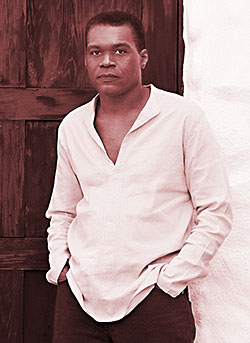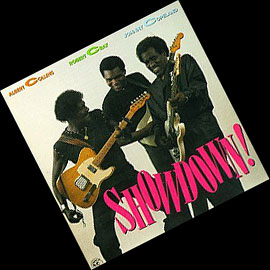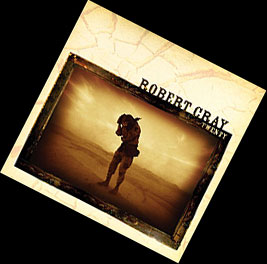
|
|||
|
|||
| Home |
| Gallery |
| Culture/ Technology |
| Fiction |
| Music |
| Poetry |
| Theater |
| What's New |
| About/Contact |
| Archive |
|
'The blues just needs to be heard' Published August 2005
Getting from a point when his career could have become defined by the media hype surrounding him to a point when he is firmly in charge of his own image took a very simple strategy, Cray explained. "There's all that chatter and all that talk, but in reality, none of that really affected us," Cray said by phone. "We just did what we do. That's how it's always been." Besides, Cray pointed out, despite his designation as the Next Big Thing in the blues in the early 1980s, "I've never really done a straight-ahead blues record." Which is true enough. Cray's accessible, melodic music is closer to r&b or soul than Delta or Southside Chicago blues. Longtime San Diego fans may recall a memorable appearance at the Belly Up Tavern in Solana Beach 20 years ago for a taping of the KPBS-TV special "Three Generations of the Blues." That night, Cray opened for L.A. bluesman Smokey Wilson and Detroit blues legend John Lee Hooker. While in many ways that show was Cray's introduction to a national blues audience, he said it was not the first time he'd played with Hooker. "We first worked with John in the late '70s," Cray recalled. "We first met him at a university in Montana. He was solo, so we opened and then he joined us on stage and we were his backing band." Cray laughed as he recalled that Hooker wouldn't tell Cray and band what key he was playing in, nor did Hooker play straight 12-bar blues. "There's an art to playing with John Lee Hooker," Cray explained.
Interestingly, Cray said his relationship with Collins went back even further than his ties to Hooker. "I saw Albert in 1969 at a rock festival in Washington State," Cray said. "And our 12th grade class voted for Albert to play our high school graduation party in 1971, and he did." Cray said that during that show, he introduced himself to Collins. Five years later, he and his band were backing Collins on a West Coast tour. But Cray said he'd never met Copeland before the "Showdown!" recording sessions. "Albert and I were standing otuside the studio, and Johnny joined us. Bruce Iglauer (Alligator Records president and album producer) had told us that Johnny had been fasting, and Albert took the opportunity to make fun of him. Albert had a great sense of humor. Albert was a prankster. That energy carried into the recording session." Cray says that in the 1970s and early '80s, when he was first starting out, there was a boom in roots music – including the blues – that doesn't exist anymore. "There was an explosion, so bands were getting heard. A lot of roots music was going on at that time," he said, citing Los Lobos, the Fabulous Thunderbirds and the Blasters as non-blues bands that were also making an impact in roots music at the time. "Then we were able to make videos, before they locked the door. And radio was playing us. These days, there's only a few mega corporations that own most of the radio stations. You don't have much of a chance to get heard except for AAA." How hard would it be for a blues band to break into the mainstream today? "It would be pretty difficult," Cray said. "Unless you have something that just goes nuclear, you don't really stand that good of a chance. Especially if you're not young." But if radio is more restricted now, Cray cited the growth of casinos as a new venue for bands to find an audience. "You see all the big rock names and jazz names and people in our genre" at the casions, Cray said. "It is another outlet. There's a huge fan base for something other than hip hop." Another change for Cray in the intervening years is the kind of songs he writes. "I write about different topics today," he said. For instance, his new album, "Twenty," includes a song outlining his opposition to the U.S. military presence in Iraq.
If the blues boom of the 1980s has faded a bit, perhaps that's not all bad in Cray's view. Young blues musicians don't generate enough media hype today for any of them to be designated the next blues savior the way Cray, Stevie Ray Vaughan and Kenny Neal were 20 years ago - something Cray thinks is probably good. "I think it's best that nobody has to carry the savior tag," he said. "It didn't affect me, but who knows if it affected anyone else. If it affects you, then it changes who you are. And you're trying to live up to somebody else's expectations then it takes you out of your groove. I don't wish that on anybody. "I was talking to Taj Mahal a couple weeks ago, and we were talking about this very subject," Cray said. "He was talking about all these people that nobody knows about that have been playing blues for a long time and we probably won't get a chance to hear them but there's people out there. "The blues doesn't need a savior," Cray added. "The blues just needs to be heard." |
Copyright © Turbula.net



